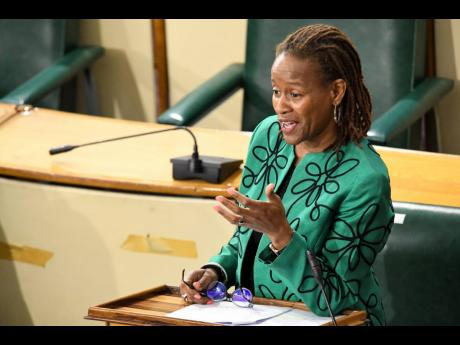Gordon Robinson | A tale of two presentations
It was the best of times; it was the worst of times.
Alright, you got me. Dickens’ eyes are rolling wherever he may be. But yet….
Regarding governance, Jamaica is experiencing the worst of times. A Government with a super parliamentary majority treats Parliament as its political lackey. Examples of this include ramming through a constitutional amendment in record time without consultation; abandoning Jamaica’s youth to the whims and fancies of corrupt policemen in unconstitutional States of Emergency disguised as crime fighting policy; and predicting urgent timelines for and outcomes of Parliament’s deliberations on a yet-to-be-tabled Constitutional Reform Bill before one citizen has the opportunity to comment.
Yet, recently, in the midst of this Parliamentary disorder, two presentations became beacons of hope for future parliamentary sanity. The first of these was delivered in the lower House on October 25 by Julian Robinson, MP for St. Andrew South-East (where I reside).
Like Dorothy Boyd (played by Renée Zellweger) in Jerry Maguire, Julian “had me at hello”. This is how he began his presentation:
“On becoming an MP, I reflected on how best I could serve my constituents, given the multiplicity of needs and the limited resources available through CDF. Given it’s impossible for an MP to undertake any large-scale infrastructure project without direct central Government support, I decided to use the majority of the resources available to me in the areas of education and training.”
Bingo! Give the man a large stuffed toy.
VOTE-BUYING MENTALITY
This is the only foundation to a prosperous national future. Traditional behaviour by MPs running around constituencies like Godparents giving handouts to help with funeral expenses; lunch money etc for which the MP must be permanently at every constituent’s beck and call for every imaginable “need” is debilitating to national development. It only encourages a vote-buying mentality that pervades Jamaica’s politics.
I’m reminded of a story I never tire of telling about former St. Ann North-East MP (1967-1978), legal and political legend Viv Blake. Viv, like his mentor Norman Manley, wasn’t famous for his tolerance (whether in politics or law) especially for nonsense. One Saturday afternoon, while Viv was at home (he lived in his constituency) taking a shower, there came a knocking on the front door and a constituent’s voice “MP, I have to see you.”
Viv ignored the constituent. But the man persisted. He knocked on every available window and door always with the same accompanying refrain, louder each time, “MP, I HAVE to see you!” Eventually Viv stepped out of the shower and opened the front door completely naked. In his driest tone, he said “Now that you have seen ALL of me, perhaps you will make an appointment to meet me at my office.” SLAM.
Expectations have only become more intrusive and unreasonable. These expectations have been encouraged by too many MPs who don’t want constituents but instead voting fodder susceptible to favouring the candidate with the deepest, most open pocket.
Education and training is the only way forward to escape this vicious cycle of dependency leading to bad governance.
But, is Julian just a talker?
“I’ve partnered with the HEART Trust NTA under a EU funded, Youth at Risk Training Program to deliver training and certification to constituents at Excelsior Community College and the International University of the Caribbean. The eight-week program consist of two weeks of core skills, which includes conflict management, self-development, family life management and career development and then six weeks in a technical skill area. Participants are assessed then certified at the end of the period. The programme is available to persons aged 17 to 29 years old, is free of cost to the participants and provides a daily stipend of $500 to assist with transportation and lunch.”
This is how it’s done. Even the lunch-money aspect, like the excellent PATH Programme, is tied to education not wrapped up in a political T-shirt. This project won’t necessarily buy votes but should produce citizens able to think clearly and contribute to nation building. After that, for whom they vote is their business.
Julian went on to propose real infrastructural improvements for constituents to include reduction of traffic congestion in the Kingston Metropolitan area; improvement in water infrastructure; and, if course, the vexed issue of garbage non-collection by NSWMA which I assure readers is the scourge of the constituency. Julian made the practical suggestion that NSWMA utilise its smaller trucks to go directly into communities and collect garbage from individual homes.
Julian and I part ways on his composting proposals. Yes, composting is the way forward but government’s irrational, haste-makes-waste policy of permitting multi-family dwellings of concrete upon concrete with zero green spaces begs the question what would residents do with compost? This complex issue requires planning first; then new developments. But that cart is long gone while a sick, lame and lazy nag hacks far behind.
Two days later, it was the Upper House that surprised with a stellar maiden State of the Nation contribution from Sherene Golding-Campbell who is obviously too young and too green (oops) around the horns to understand she’s supposed to speak politically not nationally.
She delivered a wide-ranging address that delved into some crucial, oft overlooked areas of national life. Predictably, media focused only on the politically sexy bit where she agreed with one C.E. Warmington MP that the Auditor General (AudGen) oughtn’t to be on the Integrity Commission (IC). Like Julian and I on composting, I’m not with her on this but her presentation deserves full consideration for its non-partisan, thoughtful approach. Her strongest argument, that private external auditors oughtn’t to be auditing IC and any AudGen’s department’s audit would be compromised by her membership, is initially attractive. But it ignores the fact that AudGen is a Constitutional Authority not a person; Mrs Monroe-Ellis isn’t involved in IC’s management; and, under the Financial Administration and Audit Act, every Public Body must include internal and external systems of auditing plus internal management controls including accounting officers, accountable officers and internal audit units.
Then there are finance ministry oversight mechanisms including Financial Secretary, Audit Committee and Public Accountability Inspectorate.
But Sherene addressed two critical issues ignored by media. She recognised the vital importance of women on the road to “prosperity” so raised a heretofore unspoken gender issue called “period poverty”. She effortlessly linked lack of interest in dealing with this real issue to a reduction of national productivity by asking the simple question “Suppose I was to propose to you that all women be given 36 to 60 days of unpaid leave every single year?” She continued: “We still in 2023 have women who must opt out of productive life because of the inability to afford a most basic and necessary component essential to that productivity”.
Her research informed her that “The United Nations Fund for Population Activities describes Period Poverty as ‘the struggle many low-income women and girls face while trying to afford menstrual products. The term also refers to the increased economic vulnerability women and girls face due to the financial burden posed by menstrual supplies. These include not only menstrual pads and tampons, but also related costs such as pain medication and underwear.’”
She wasn’t finished:
“Mr President a check of just three major supermarkets indicates that at the low end, period products can cost anywhere from $200 per pack of ten to $500. The American College of Obstetrics and Gynaecologists recommend changing the sanitary material every four to eight hours.”
You do the math. Then work out the cost in reduced hours and reduced productivity even from those who “tough it out” and come to work. This problem has been swept under the carpet for too long. Now Sherene has exposed it what will governments do?
Then she addressed an issue close to my heart namely the outdated and impractical way the Industrial Disputes Tribunal (IDT) is operating. Exhibiting a depth of research not normally seen in Parliament, Sherene traced the IDT’s origins; it’s evolution from being a reliable and effective resource for settling disputes with unionised workers into an alternative to the Supreme Court for all workers. She pointed out the Labour Code, created as a “guideline” but now used as inflexible law, was never tailored for and has become an obstacle to medium and small businesses.
The Labour Code’s complicated provisions requiring unbiased tribunals; appeal processes to independent panels; and other systems designed to produce fairness, are turning out very unfair to small businesses without the personnel or resources to provide these layers of “fairness”.
Bravo to Sherene for highlighting these forgotten areas needing urgent reform. Between Julian and Sherene, there’s hope for Jamaican governance. May they live long and prosper.
Peace and Love.
- Gordon Robinson is an attorney-at-law. Send feedback to columns@gleanerjm.com


